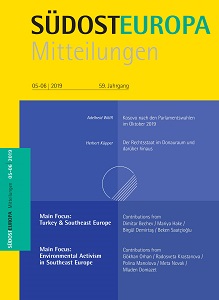Kosovo nach den Parlamentswahlen im Oktober 2019. Neue Reformagenda und Perspektiven für ein Abkommen mit Serbien
Kosovo after the Parliamentary Elections in October 2019. New Agenda and Perspectives for Agreement with Serbia
Author(s): Adelheid WölflSubject(s): Public Administration, International relations/trade, Electoral systems, Inter-Ethnic Relations, Politics of History/Memory, Politics and Identity, Peace and Conflict Studies
Published by: Südosteuropa Gesellschaft e.V.
Keywords: Elections; Kosovo; Serbia;
Summary/Abstract: With the likely formation of a new coalition in Kosovo in December 2019, many changes are emerging for the youngest state in Europe. Those parties that emerged from the Kosovo Liberation Army (UÇK) will no longer be in power and President Hashim Thaçi can’t expect any support from the new government. For Vetëvendosje (VV) the reform of the judiciary and the fight against endemic corruption is a first priority order. VV is supported by many young Kosovars who are looking for a systemic change in their country and have lost trust in the old elites. The prospective coalition partner of VV, the Democratic League of Kosovo (LDK), second winner of the snap elections on 6 October 2019, will focus on innovations in the education system, support for families and the fight against poverty. Entering the dialogue with Serbia at the beginning of 2020, the new government in Kosovo will stick to the old red lines and it will be very difficult to find any agreement that facilitates a recognition of Kosovo by Serbia. VV President Albin Kurti already excluded any change of borders or a land swap while Serbia’s President Aleksandar Vučić is excluding any solution without changing borders so far. With the first government participation of VV it becomes visible that the influence of the United States on Kosovo’s internal politics has decreased.
Journal: Südosteuropa Mitteilungen
- Issue Year: 2019
- Issue No: 05-06
- Page Range: 8-17
- Page Count: 10
- Language: German
- Content File-PDF

